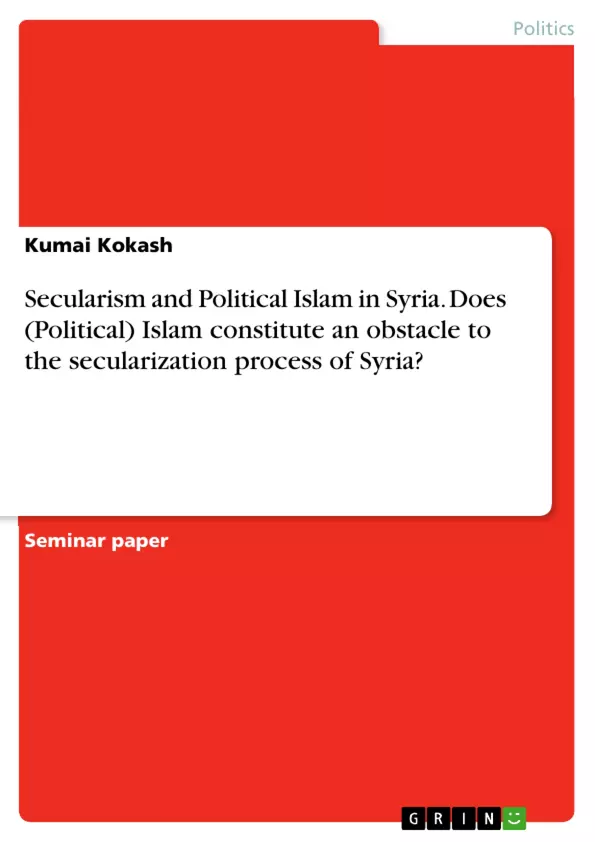In this paper it will be examined that Islam is a stumbling block in the way of the secularization process in Syria. Syria is choosen firsty, because many scholars and writers actually claim that Syria is already a secularist country which is a highly controversial and debatable claim. Secondly, because the (political) Islam in Syria does not have the same power it has in other Muslim Arabic countries and this makes Syria a somehow good candidate for becoming a secularist country.
This paper contains four main chapters and it is structured as follows: After the introduction, in the first chapter secularism and secularization is briefly defined and then it will explained why the religion Islam and the (political) Islam cannot be separated. In the second chapter it is presented the point of view which says that Islam is deep inside incompatible with secularism. On the contrary side, namely in the third chapter, it is presented the other point of view which claims that Islam can very well come along with secularism. The fourth chapter will be the conclusion. Furthermore, a connection with Syria based on the content of the chapters will be made at the end of the first and the last chapter.
Inhaltsverzeichnis (Table of Contents)
- Introduction:
- 1- Syria between Secularism and the (political) Islam:
- 2- The Islamic Doctrine as the Origin of the Conflict with Secularism:
- 3- Secularism in the Islamic Doctrine:
- 4- Conclusion:
Zielsetzung und Themenschwerpunkte (Objectives and Key Themes)
This paper examines the claim that Islam is a stumbling block in the way of the secularization process in Syria. The author argues that the (political) Islam in Syria cannot be separated from the religion of Islam, and explores both sides of the debate on whether Islam is compatible with secularism. The paper will examine the historical and contemporary context of this debate, and how it has impacted the Syrian context.
- The relationship between secularism and (political) Islam in Syria.
- The historical and contemporary debate surrounding the compatibility of Islam and secularism.
- The role of the Sharia in Islamic governance.
- The impact of Western notions of secularism on the Islamic world.
- The influence of the Islamic doctrine on the development of (political) Islam.
Zusammenfassung der Kapitel (Chapter Summaries)
The first chapter defines secularism and secularization, arguing that they are distinct concepts. The author then explains why (political) Islam and the religion of Islam are intertwined and cannot be separated. This chapter also connects the concepts of secularism and (political) Islam to the context of Syria.
Chapter two presents the argument that Islam is inherently incompatible with secularism, citing the Islamic doctrine and the historical development of (political) Islam as evidence. The chapter explores how the values and principles of Islam are seen as fundamentally opposed to secular values.
Chapter three presents the opposing perspective, arguing that Islam can coexist with secularism. This chapter examines how some interpretations of Islamic principles can be compatible with secular values, and explores examples of secular Islamic societies.
Schlüsselwörter (Keywords)
This paper examines the complex relationship between (political) Islam, secularism, and secularization in the context of Syria. It focuses on the historical development of the Islamic doctrine, the role of the Sharia in Islamic governance, and the impact of Western notions of secularism on the Islamic world. The paper also explores key themes such as the compatibility of Islam and secularism, the influence of the Islamic doctrine on the development of (political) Islam, and the challenges of achieving secularization in a predominantly Muslim country.
Frequently Asked Questions
Is Syria a secularist country?
The claim that Syria is secular is highly controversial. This paper examines whether the influence of Islam constitutes an obstacle to the actual secularization process.
Can political Islam be separated from the religion of Islam?
The author argues that in the Syrian context, political Islam and religious doctrine are deeply intertwined and cannot be easily separated.
Why is Syria a special case for secularization in the Arab world?
Syria is considered a candidate because political Islam historically had less power there compared to other Muslim Arabic countries.
What are the arguments against the compatibility of Islam and secularism?
One viewpoint suggests that Islamic doctrine is fundamentally incompatible with secularism due to the comprehensive nature of Sharia law in governance.
Are there interpretations of Islam that support secularism?
Yes, the paper also presents perspectives claiming that Islamic principles can indeed coexist with secular values and governance.
- Arbeit zitieren
- Kumai Kokash (Autor:in), 2018, Secularism and Political Islam in Syria. Does (Political) Islam constitute an obstacle to the secularization process of Syria?, München, GRIN Verlag, https://www.grin.com/document/956402



